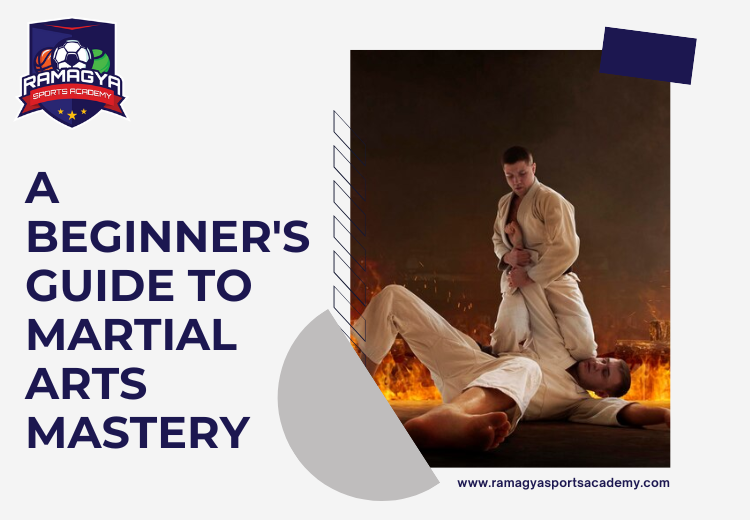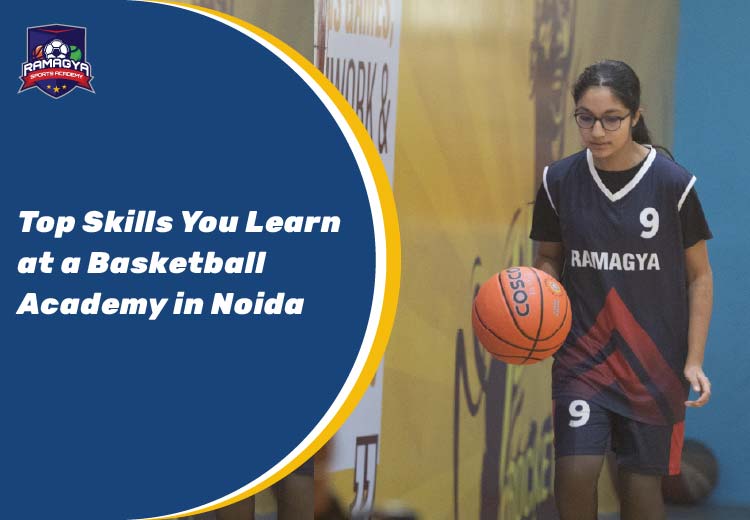
10 Tips for Stay Fit and Healthy
March 27, 2024
Pragyan Bhati Secures 2nd Place in AITA U-16 Boys Category!
April 2, 2024A Beginner's Guide to Martial Arts Mastery
 Beginning to learn martial arts can be like entering another world – where physical discipline meets mental strength. But starting this journey may seem intimidating at first. Yet martial arts for beginners training can be extremely fulfilling and transformative under proper supervision and with the appropriate attitude – here are some essential training pointers designed especially for people new to martial arts; whether your interest lies with Brazilian Jiu-Jitsu, Taekwondo or Karate; they will help guide the early phases of your training adventure with confidence and clarity.
From finding a style that speaks to you to remaining humble and accepting feedback, each tip outlined here aims to build a solid basis for your growth and development as a martial artist. So grab your training shoes, clear your mind, and join me as we embark on this exciting adventure into martial arts!
Beginning to learn martial arts can be like entering another world – where physical discipline meets mental strength. But starting this journey may seem intimidating at first. Yet martial arts for beginners training can be extremely fulfilling and transformative under proper supervision and with the appropriate attitude – here are some essential training pointers designed especially for people new to martial arts; whether your interest lies with Brazilian Jiu-Jitsu, Taekwondo or Karate; they will help guide the early phases of your training adventure with confidence and clarity.
From finding a style that speaks to you to remaining humble and accepting feedback, each tip outlined here aims to build a solid basis for your growth and development as a martial artist. So grab your training shoes, clear your mind, and join me as we embark on this exciting adventure into martial arts!
- Find the right Martial Arts Style: Finding the appropriate martial arts for beginners style is of utmost importance while beginning your training journey. Take time to discover various martial arts disciplines, such as Karate, Taekwondo, Jiu-Jitsu or Muay Thai, to determine which best meets your interests, goals and physical capabilities. Consider factors like emphasis on striking or grappling, level of contact involved and philosophical principles underlying each style. To gain a sense of the environment and teaching methodology at different martial arts schools, attend trial classes and watch demonstrations. Remember that no one method is right for everyone, so follow your gut and select a look that satisfies your goals and tastes. Discovering your style provides a strong foundation for martial arts training since it keeps you focused, inspired, and dedicated as you strive to reach your objectives.
- Start Slow: Starting slowly is essential for beginning martial artists in order to reduce injury and build a firm foundation. Rushing into intense training too soon may result in muscle strain, fatigue or more serious injuries. Start off with focusing on basic techniques before gradually increasing intensity and duration as your body adapts and strengthens. Pay attention to any signs of discomfort or fatigue by listening to your body. Taking breaks as necessary may prevent overexertion and provide needed recovery time. Remember, progress takes time, so be patient with yourself and trust the process. Starting slowly can help ensure long-term success and enjoyment throughout your martial arts journey!
- Focus on Fundamentals: Beginners in martial arts for beginners will benefit greatly by placing great importance on developing their foundational skills and comprehending its core principles. Take time to master the fundamental movements, stances, and principles specific to your chosen martial art before diving headfirst into more advanced techniques. Doing this will provide stability as you advance to more complex techniques. By developing solid fundamentals, you will develop proper technique, body mechanics and muscle memory – essential elements for performing techniques effectively and efficiently. Mastery begins with strong fundamentals. Thus, prioritize them for maximum improvement of your martial arts practice and embrace its journey as you move towards mastery.
- Pay Attention to Your Body: Listening to Your Body is critical for newcomers to martial arts to avoid injury and maximize performance. Pay attention to any signs of discomfort, pain, or fatigue[1] during training sessions. If you experience sharp or persistent pain, it’s essential to stop and assess the situation to prevent aggravating any injuries and recognize muscle soreness from exertion versus overuse or strain pain. Taking breaks when necessary and allowing your body to rest and recover is key to avoiding burnout and improving overall well-being. Remember that rest is just as essential to training as it allows muscles to heal and strengthen. Listening to and responding accordingly will allow for more efficient training sessions, long-term progress and an overall healthier martial arts journey.
- Practice Regularly: Beginning martial artists need regular practice sessions in order to build proficiency, confidence, and muscle memory. Consistency is key to mastering techniques and creating a solid foundation within their chosen discipline. Make time for regular training that fits into your busy life, be it attending classes several times per week or dedicating solo practice at home. By setting a regular practice schedule, you can reinforce learning and make steady strides forward over time. Repetition of movements and drills helps refine technique, enhance coordination and develop overall skill levels. Adopt the mantra “practice makes perfect” and approach every training session with diligence and determination. Remember that even incremental progress adds up and adds to your journey as a martial artist! So make practice an important priority, be disciplined in your approach, and watch as your skills flourish through consistent effort and hard work!
- Seek Guidance from Instructors: Beginning martial artists would do well to seek guidance from experienced instructors as a means of expediting learning and honing techniques more rapidly. Instructors possess vast expertise, understanding and insight into various disciplines within martial arts. Provide personalized feedback, corrections, and guidance tailored to your progress and goals. Don’t be shy to ask questions and seek clarification of techniques or concepts you find confusing or challenging. Welcome the opportunity to gain from their wisdom and experience and be open to constructive criticism. Please put your trust in their guidance and follow their instructions diligently, as they have your best interests as a martial artist in mind. Establishing strong bonds with instructors creates an optimal learning environment and sets the stage for continuous growth and progress. So tap into their wealth of knowledge and let their guidance propel your martial arts journey forward.
- Accept Feedback: For beginners in martial arts, accepting feedback is critical to accelerate and refine their abilities. Receiving constructive criticism from instructors and training partners provides insight into areas of strength as well as potential areas for improvement. Taken the right way, feedback can be an opportunity for growth and learning. Remain open-minded and accepting of suggestions while looking for ways to incorporate feedback into your practice sessions. Feedback can be an indispensable ally on your journey towards mastery of martial arts, helping to refine techniques, correct errors, and enhance overall performance. Accepting feedback with humility and gratitude will accelerate your development as a martial artist while building a firm foundation for future success. So welcome it with open arms – let feedback guide your journey towards mastery!
- Stay Humble: Humbling oneself when beginning martial arts can help promote a culture of respect, openness, and continual learning. Maintaining humility allows you to approach training with a sense of curiosity and openness towards new experiences and knowledge. Acknowledging there’s always more to learn and room for growth regardless of current proficiency is the key to developing yourself as an athlete. By remaining humble and learning from instructors, training partners, mistakes, setbacks, and your own mistakes and missteps – be they instructors’ instructions, training partners’ feedback or your own mistakes and missteps. Embrace every opportunity for growth that arises in training environments that foster camaraderie and mutual development instead of competitiveness and self-centered attitudes. By staying humble, you also cultivate an attitude conducive to progress both on and off the mat; keep your ego in check, remain open to feedback, and approach each session with humility and an eagerness to learn.
- Set Realistic Goals: Beginners in martial arts need to set reasonable goals in order to stay motivated, focused, and on track with their training journey. Take some time to consider your aspirations while setting specific, attainable objectives that fit with both your current skill level and commitment level. No matter the goal you set for yourself – from mastering a particular technique or earning a new belt rank to joining local tournaments – make sure your goals are set in an attainable but challenging manner within an acceptable timeline. Create milestones that help you measure progress and celebrate achievements along the way. Be honest with yourself regarding your abilities and limitations, setting realistic goals that push beyond your comfort zones yet remain within reach. By setting these realistic goals, you’ll maintain a sense of direction in your training while working toward becoming the martial artist you aspire to become.
- Enjoy the Journey: An important mindset for beginners in martial arts for beginners training to adopt is “Enjoy the Journey”, reminding them to find joy and fulfillment throughout their training experience. Focus instead on learning, growing, and evolving as a martial artist rather than only on its end goals or achievements. Be open-minded towards all challenges, setbacks, triumphs and experiences along your journey – each is important to your overall development and personal growth. Foster an attitude of curiosity, exploration, and appreciation. Take every opportunity to expand your knowledge and skill sets. Remember that martial arts is about embarking on an amazing journey rather than reaching a destination alone. By enjoying your journey, you will gain a greater appreciation of martial arts art form, resilience in facing challenges and greater satisfaction from training endeavors. So make the most out of each moment, embrace each experience and let martial arts enrich your life in meaningful ways!
Conclusion:
As you embark on your martial arts for beginners journey, keep this in mind: progress isn’t simply measured in belts earned or techniques mastered – rather, it should reflect discipline learned, resilience shown and personal growth both on and off the mat. Adopting the top ten training tips outlined in this guide – from mastering fundamentals to setting achievable goals – you’ll become not only an accomplished martial artist but also an exemplary individual with discipline, confidence and focus. Make time to embrace challenges, recognize victories and enjoy the journey! Martial arts is not simply physical prowess – it is about self-discovery, personal development and striving for excellence. Keep an open mind, stay committed to your practice, and let your passion for martial arts guide your path toward mastery.Read our Article: The Thrills of Muay Thai Boxing Academy in India



